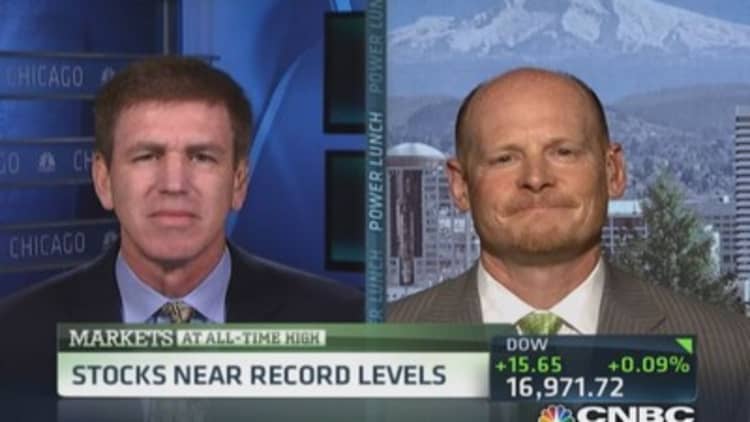If you've already been solo-managing your retirement portfolio or are just now thinking about tackling it on your own, remember these key considerations, no matter what your age is: allocation, risk tolerance and time horizon.
And then remember the importance of regularly rebalancing your portfolio—altering your holdings as necessary to reflect your intended distribution of investments.
"Rebalancing is important because it helps you sell high and buy low," said certified financial planner Catherine Valega, owner of Green Bridge Wealth Management.
For workers in their 20s or 30s who are just starting to build a nest egg, financial advisors agree that at least 90 percent of retirement dollars should be in stocks.
"At that point, you have a long time ahead of you until you need [the money]," said certified financial planner Avani Ramnani, director of financial planning and investment management at Francis Financial.
Read MorePros, cons of target-date funds
"You can deal with the ups and downs of the stock market and have time to recover from the downs," she said. "So definitely be aggressive."
Professionals peg average historical annual stock returns at 7 percent to 8 percent. So where should young investors put their money? Stocks should be divvied up among U.S. and international equities.
Russ Robertson, a certified financial planner with WealthCrest Financial Services, offers a scenario where 50 percent of that stock allocation is invested in large-cap stock funds, 30 percent in small-cap stock funds and 20 percent in international stock funds.
Robertson and other advisors break it down further. For instance, Ramnani's allocation recommendation for clients has recently changed.
Read MoreChurch preaches financial literacy
"The research we've done for our clients shows that international [markets], specifically emerging markets, are going to produce more growth compared to U.S. domestic equities in five, 10 or 15 years," Ramnani said.
"So for someone who is younger, it makes sense to have more exposure to emerging markets," she explained, adding, "We used to put more than 10 percent of a client's portfolio [in emerging markets], but now we're definitely doing more than that."
Ramnani cautions, however, that without professional guidance, it can be tricky to figure out exactly how far above 10 percent that allocation should be.

For those in their 40s or 50s, the advice doesn't change too much beyond the stock holdings vs. fixed income.
"You still want a heavy dose of [stocks] in your portfolio—at least 60 percent to 80 percent," said Valega at Green Bridge Wealth Management.
"If you're 50, you could work for another 20 years," she added. "A lot of us are going to have to work longer than we thought."
Read MoreSqueezed, sandwich generation seeks help
Also, Valega and other advisors point out that even if investors retire in their 60s, they might live another 30 years, and their investments should reflect that time horizon.
Regardless of age, allocation is key.
"You don't want to do something like put all [of your retirement money] in a tech fund just because technology is your passion," Valega said. "You want to have a broad-based selection of equities."
Once you have that broad exposure to the stock market, rebalancing matters. If you intend to expose 50 percent of your stock holdings to large-cap funds, 30 percent in small-cap funds and 20 percent in international funds, make sure you don't veer from that allocation.
Read MoreAvoid these 8 retirement screwups
Using the above example, if international funds go hog wild and you don't rebalance your holdings, you could find yourself with, say, 30 percent exposed to international funds and decreased exposure to other stocks and fixed income that you had originally decided on.
Valega put it this way: "For example … you start with 60 percent equities and 40 percent bonds. If equities have a bull run, [they] now represent 80 percent of your portfolio."
By rebalancing, she explained, you harvest the gains and redeploy money into lesser-valued assets.
Actively managed funds have to beat the market by 1 percent to meet expenses. So we like index funds and [exchange-traded funds].Russ Robertsoncertified financial planner at WealthCrest Financial Services
Like many advisors, Robertson at WealthCrest is a fan of index funds, which are low-cost and follow a broad stock index.
"Actively managed funds have to beat the market by 1 percent to meet expenses," he said. "So we like index funds and [exchange-traded funds]."
No matter what the investor's age is, the amount of his or her portfolio going to non-stock investments matters—especially right now.
Interest rates are low, but the bond market is facing challenges.
Read MoreCheck this list before donating to charity
"We know interest rates are going to go up," said Ben Tobias, a certified financial planner and president of Tobias Financial Advisors. "We just don't know when."
Tobias and other advisors say that right now long-term bonds are riskier than shorter-term bonds. This is because as interest rates rise, yields on bonds drop.
Currently, if you hold longer-term bonds, your risk is greater. Advisors recommend that a portfolio's portion dedicated to fixed income should be broad-based.
At Francis Financial, Ramnani said go-it-alone investors should avoid letting emotions dictate their investment decisions. "If they hear great stories about the market, they get excited and more aggressive than they have been," she said. "But when there's bad news or the market plunges … they sell."
Read MoreThe dos and dont's of trusts
Greed and fear, she said, can play a much bigger part of an investment strategy than it should. "These emotions are harmful." Investors "will end up buying high and selling low, purely because of emotions," she explained.
A person's risk tolerance should always be considered. "But it should be about what's going on in your own life, not what's happening in the world," Ramnani said.





